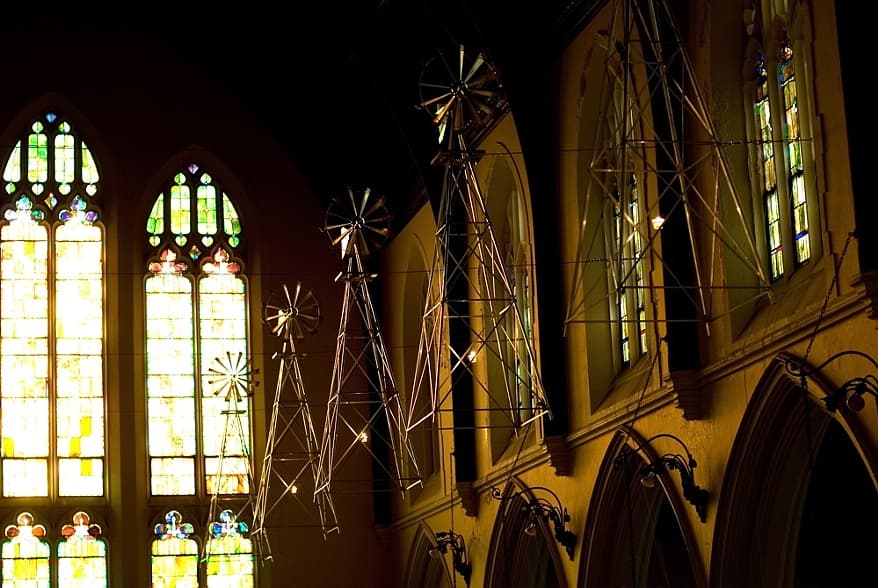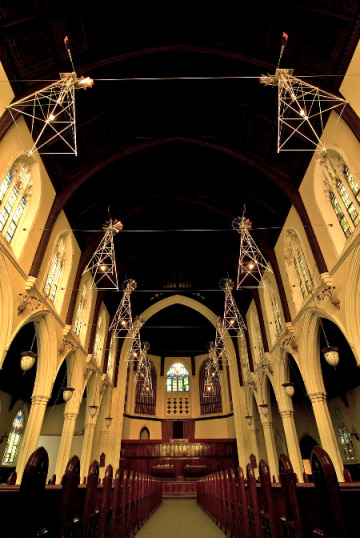March 30: The Holy Spirit: Empowering and Redeeming the Church
♫ Music:
Wednesday, March 30
Scripture: Acts 2:1-13
When the day of Pentecost arrived, they were all together in one place. And suddenly there came from heaven a sound like a mighty rushing wind, and it filled the entire house where they were sitting. And divided tongues as of fire appeared to them and rested on each one of them. And they were all filled with the Holy Spirit and began to speak in other tongues as the Spirit gave them utterance. Now there were dwelling in Jerusalem Jews, devout men from every nation under heaven. And at this sound the multitude came together, and they were bewildered, because each one was hearing them speak in his own language. And they were amazed and astonished, saying, “Are not all these who are speaking Galileans? And how is it that we hear, each of us in his own native language? Parthians and Medes and Elamites and residents of Mesopotamia, Judea and Cappadocia, Pontus and Asia, Phrygia and Pamphylia, Egypt and the parts of Libya belonging to Cyrene, and visitors from Rome, both Jews and proselytes, Cretans and Arabians—we hear them telling in our own tongues the mighty works of God.” And all were amazed and perplexed, saying to one another, “What does this mean?” But others mocking said, “They are filled with new wine.” But Peter, standing with the eleven, lifted up his voice and addressed them: “Men of Judea and all who dwell in Jerusalem, let this be known to you, and give ear to my words. For these people are not drunk, as you suppose, since it is only the third hour of the day. But this is what was uttered through the prophet Joel:
“‘And in the last days it shall be, God declares,
that I will pour out my Spirit on all flesh,
and your sons and your daughters shall prophesy,
and your young men shall see visions,
and your old men shall dream dreams;
even on my male servants and female servants
in those days I will pour out my Spirit, and they shall prophesy.
And I will show wonders in the heavens above
and signs on the earth below,
blood, and fire, and vapor of smoke;
the sun shall be turned to darkness
and the moon to blood,
before the day of the Lord comes, the great and magnificent day.”
THE HOLY SPIRIT: EMPOWERING AND REDEEMING THE CHURCH
On the day of Pentecost, the apostles and believers who had waited for the promise of the Holy Spirit (Acts 1:4-8; John 7:37-39, 14:15-30) experienced more than just a temporary empowerment of the Holy Spirit, they experienced the indwelling presence of the Holy Spirit. In the installation by Dayton Castleman Tilting at Giants, twelve windmills are suspended in this beautiful sanctuary reminding us of the disciples “waiting in a room together [when] ‘suddenly’ a sound like the blowing of a violent wind came from Heaven and filled the whole house and ‘tongues of fire’ came to rest on them.” As you reflect on this work and an image of the Holy Spirit descending and moving through the blades, enlivening and giving power to these windmills, how might God breath life and new empowerment into you, for His purposes? How might the indwelling presence of the Holy Spirit, rest upon you, and continue to bring conviction and purpose to your life?
Pentecost changed how God communed and tabernacled with His people. Those who have a life-saving relationship with God through the work of Jesus Christ on the cross, have also received the indwelling presence of the Holy Spirit. It means that God is always with you and you are not alone as He empowers you to do the work and become the person He has created you to be.
As we step back and look at God’s redemptive hand throughout scripture, we can’t help but connect Pentecost and the Old Testament account of the Tower of Babel. It is interesting to pay attention to the international nature of the crowd, these God-fearing Jews who came from the dispersion, from every nation under heaven and when they were filled with the Holy Spirit, they began to speak in other tongues and languages, hearing and understanding each other as the Spirit empowered them. I recall Pastor Adam Edgerly, of NewSong LA, connecting the dots for me, that Pentecost was God’s redemptive work in reversing Babel (Genesis 11).
The builders of the Tower of Babel, tried to establish themselves and create their own security apart from God by building a tower that would be “in the heavens” close to God. Building a city and tower wasn’t the sin, it was their pride and futile efforts that God intervened to thwart. He removed their ability to communicate and confused their language so that they couldn’t continue to work together independently of Him. He changed their communion with each other, just as they stepped away from their communion with Him...God’s redemptive purposes are always at work bringing about His Kingdom and reconciling His people, His Church, to Himself for His glory. What better way could there be, than giving Himself, in the empowerment of the Holy Spirit, to more fully and intimately commune with His people at Pentecost? He redeemed the confusion of their languages at Babel through the indwelling presence of the Holy Spirit. We can see the redemptive, reconciling hand of God at work, redeeming what was fallen and broken, bringing clarity, understanding and a common foundation rooted in the presence of God.
Today as the people of God and Body of Christ, we join in this work, empowered by the Holy Spirit, our helper, to proclaim the gospel and build His church. We are like the windmills in Tilting at Giants, where the Holy Spirit breathes life and empowerment to the redemptive work that He is already doing in and through us. What is God’s invitation for you today? In what ways, is God calling you to His redemptive purposes so that you can move and cooperate with Him? May we continue to depend on the indwelling presence of the Holy Spirit, unified in the Body of Christ, His Church as we work out our salvation and His Kingdom purposes.
PRAYER
Father, Son and Holy Spirit, we draw near to you today. We offer ourselves to you as our act of worship. Father we thank you that you are sovereign and in control of all things, bringing about your redemptive Kingdom work. Jesus we thank you for your work on the cross reconciling us to yourself. Holy Spirit we thank you that we are never alone, because you are always with us. We thank you for the Body of Christ. Empower us to do the work that you have called us to do together. Deepen our love and dependence on you and on one another for your glory. We pray all these things in the name of Jesus.
Amen.
Lisa Ishihara, Director of Chapel Programs
Tilting at Giants
Dayton Castleman
Aluminum, steel, votive candles, glass votive holders, braided fishing line, steel cable, rigging hardware
Chambers-Wylie Memorial Presbyterian Church, Philadelphia, Pennsylvania
About the Artist and Art
Dayton Castleman is a multidisciplinary Arkansas artist known for his large scale sculptures, installations, curatorial projects, choreography and writing. His work has been presented in museums, galleries, and other venues throughout the United States and Europe. He received his undergraduate degree from Belhaven University in Jackson, Mississippi, and his MFA in sculpture from the School of the Art Institute of Chicago. Tilting at Giants is a permanent site-specific installation located in the historic Chambers-Wylie Memorial Presbyterian Church in downtown Philadelphia, Pennsylvania. Now operated by Broad Street Ministry, the work was commissioned by the ministry with an open call for proposals administered through the Philadelphia Percentage for Art Program.
Castleman writes:
Twelve enormous windmills fill the sanctuary, looming over the worship setting, enveloped by the Gothic vault. The windmills are unexpected, anachronistic, and misplaced in this space. Like sentinels keeping watch, the sun-burst fans are poised, brimming with potential energy, waiting for a mysterious, transcendent wind to fill the space and make it sacred. Cradled within each tower, nearly lost in the spectacle, hover votive candles, glowing, unflickering, in prayer. This sanctuary is a living prayer--an aching, tense, expectant prayer. This reminds us of the event at Pentecost recorded in the book of Acts, where the twelve disciples are waiting in a room together and ‘suddenly’ a sound like the blowing of a violent wind came from from Heaven and filled the whole house and ‘tongues of fire’ descended on them. This (church interior) is waiting for wind and fire.
www.daytoncastleman.com
About the Music #1
“The Wind of the Spirit”
About the Composer
Olivier Messiaen (1908 - 1992) was born in Avignon, France. Debussy and Gluck were early influences on the young composer. He entered the Paris Conservatoire at the age of eleven and stayed there until his early twenties. Messiaen became an organist of La Sainte Trinité in Paris when he was 22, and remained there until his death some 70 years later. Messiaens' contribution to the organ repertoire is probably the greatest since J.S. Bach. Messiaens' devout Christian faith and Catholicism drove his compositional output through the years and set him apart from the majority of composers in the Twentieth Century. There was no greater test of his faith than in June 1940 when he was captured by the Nazis and sent to a prisoner of war camp in Poland. During his internment, Messiaen wrote and performed his most famous and compelling work, “Quartet for the End of Time.” He returned from captivity in March 1941 and became a teacher and lecturer at the Paris Conservatoire. “Wind of the Spirit” is known for its mystical harmonies and emotional swells as the listener is overwhelmed by the immersive experience of the Holy Spirit’s arrival.
About the Music #2
“Come, Holy Ghost”
Lyrics
Come, Holy Ghost our souls inspire,
And lighten with celestial fire;
Thou the anointing Spirit art,
Who dost thy sevenfold gifts impart.
Thy blessed unction from above
Is comfort, life, and fire of love;
Enable with perpetual light
The dullness of our blinded sight.
Anoint and cheer our soiled face
With the abundance of thy grace;
Keep far our foes, give peace at home;
Where thou art guide no ill can come.
Teach us to know the Father, Son,
And thee of Both to be but One
That through the ages all along
This may be our endless song,
Praise to thy eternal merit,
Father, Son, and Holy Spirit.
About the Composer #2
Jonathan Harvey (1939-2012) was a British composer. He held Professor of Music posts at both Sussex and Stanford Universities and was the recipient of six honorary doctorates from distinguished British universities. The great Pentecostal hymn “Come Holy Spirit,” is based on a latin text translated by Bishop John Cosin in his Collection of Private Devotions (1627). In Harvey’s setting of the hymn, the coming of the Holy Spirit infiltrates not only the text but the music as well. Much of the composition is based on a pentatonic chord, and rhythmically reflects the floating rhythms of plainchant. “Individual voices sing prescribed fragments in their own time--‘speaking in tongues’--while the sopranos float an augmented version of the hymn above.”
www.jonathanharveycomposer.com

